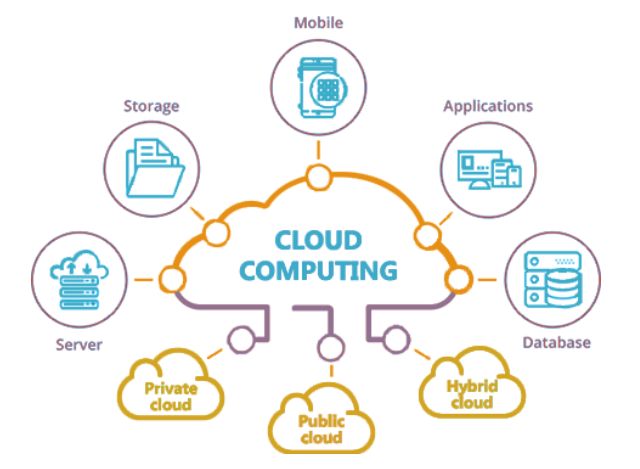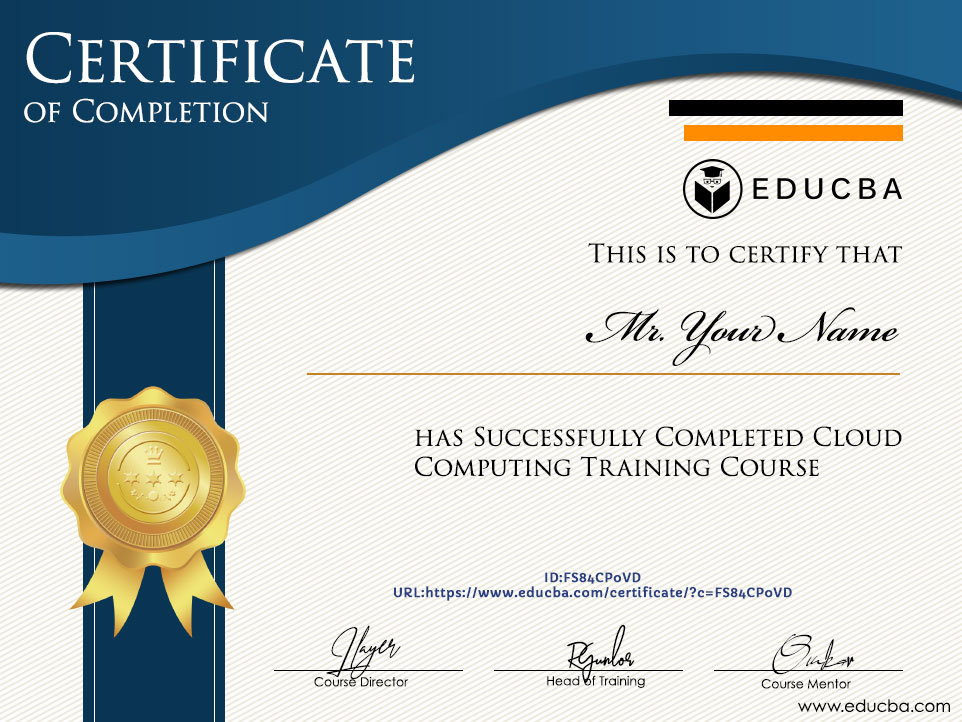Overview:
Welcome to the “Mastering Cloud Computing” course, where you will embark on a transformative journey into the dynamic world of cloud technology. This comprehensive course is designed to equip you with the skills and knowledge needed to navigate the ever-evolving landscape of cloud computing. Whether you are a beginner or an experienced professional, this course will empower you to harness the full potential of cloud services.

Course Objectives:0
- Understanding Cloud Fundamentals:
- Introduction to Cloud Computing
- Key Cloud Service Models: IaaS, PaaS, SaaS
- Deployment Models: Public, Private, Hybrid, and Multi-Cloud
- Cloud Service Providers:
- In-depth exploration of major providers (AWS, Azure, Google Cloud)
- Hands-on experience with cloud platforms
- Comparative analysis of services offered by different providers
- Virtualization and Containers:
- Virtual Machines (VMs) vs. Containers
- Docker and Kubernetes: Container Orchestration
- Containerization for scalable and portable applications
- Networking in the Cloud:
- Cloud networking essentials
- VPCs, Subnets, and Security Groups
- Load balancing and Content Delivery Networks (CDN)
- Storage and Database Services:
- Cloud storage options (Object, Block, File)
- Database as a Service (DBaaS)
- Data security and backup strategies
- Security in the Cloud:
- Identity and Access Management (IAM)
- Encryption and Key Management
- Compliance and Governance in the Cloud
- Serverless Computing:
- Function as a Service (FaaS)
- Building and deploying serverless applications
- Cost implications and optimization strategies
- Monitoring and Optimization:
- Cloud monitoring tools
- Performance optimization techniques
- Cost management best practices
- Cloud Migration Strategies:
- Assessing and planning for migration
- Lift and shift vs. re-architecting
- Case studies of successful cloud migrations
- Project Work and Real-World Scenarios:
- Collaborative projects to apply learned concepts
- Case studies from industry leaders
- Guest lectures from experts in the field
Methodology:
- Lectures and Demos: Engaging lectures with real-world examples and live demonstrations.
- Hands-on Labs: Practical exercises on cloud platforms to reinforce theoretical concepts.
- Projects: Collaborative projects to simulate real-world scenarios and challenges.
- Guest Speakers: Industry experts sharing insights and experiences.
- Quizzes and Assessments: Regular assessments to track progress and reinforce learning.
Prerequisites:
- Basic understanding of computer networks and operating systems.
- Familiarity with programming concepts (preferred, but not mandatory).
Target Audience:
- IT professionals looking to enhance their cloud computing skills.
- Software developers and architects interested in cloud-native application development.
- Business and IT decision-makers exploring cloud adoption for their organizations.
Certification:
Upon successful completion of the course, participants will receive a certification that validates their expertise in cloud computing, a valuable asset in today’s tech-driven job market.

Join us on this exciting journey as we unravel the mysteries of cloud computing and empower you to become a proficient cloud practitioner! Enroll now and unlock the doors to a future in the cloud.
Module 1: Introduction to Cloud Computing
- Overview of Cloud Computing
- Definition, history, and evolution
- Importance and benefits in the IT landscape
- Cloud Service Models
- Infrastructure as a Service (IaaS)
- Platform as a Service (PaaS)
- Software as a Service (SaaS)
- Deployment Models
- Public, Private, Hybrid, and Multi-Cloud
Module 2: Cloud Service Providers
- Major Cloud Providers
- Amazon Web Services (AWS)
- Microsoft Azure
- Google Cloud Platform (GCP)
- Hands-On Labs
- Setting up accounts on major cloud platforms
- Navigating through cloud consoles
Module 3: Virtualization and Containers
- Virtualization Basics
- Hypervisors and virtual machines
- Benefits of virtualization in the cloud
- Containerization Technologies
- Docker fundamentals
- Kubernetes orchestration
- Building and deploying containerized applications
Module 4: Networking in the Cloud
- Cloud Networking Essentials
- Virtual Private Clouds (VPCs)
- Subnets, Security Groups, and Network ACLs
- Load Balancing and CDN
- Distributing traffic for high availability
- Optimizing content delivery for global audiences
Module 5: Storage and Database Services
- Cloud Storage Options
- Object, Block, and File storage
- Database as a Service (DBaaS)
- Managed database solutions
- Data Security and Backup Strategies
- Ensuring data integrity and confidentiality
Module 6: Security in the Cloud
- Identity and Access Management (IAM)
- Managing user access and permissions
- Encryption and Key Management
- Securing data in transit and at rest
- Compliance and Governance
- Meeting regulatory requirements in the cloud
Module 7: Serverless Computing
- Introduction to Serverless Architecture
- Function as a Service (FaaS) concepts
- Building and Deploying Serverless Applications
- Practical examples using serverless frameworks
- Cost Implications and Optimization
- Strategies for optimizing serverless costs
Module 8: Monitoring and Optimization
- Cloud Monitoring Tools
- Utilizing native and third-party monitoring solutions
- Performance Optimization Techniques
- Scaling resources based on demand
- Cost Management Best Practices
- Identifying and mitigating cost inefficiencies
Module 9: Cloud Migration Strategies
- Assessing and Planning for Migration
- Evaluating existing infrastructure for cloud readiness
- Lift and Shift vs. Re-architecting
- Choosing the right migration approach
- Case Studies of Successful Cloud Migrations
- Learning from real-world examples
Module 10: Project Work and Real-World Scenarios
- Collaborative Projects
- Applying learned concepts to solve practical challenges
- Case Studies from Industry Leaders
- Insights from organizations that have successfully adopted the cloud
- Guest Lectures from Experts
- Engaging with industry professionals for firsthand experiences
Assessment and Certification
- Quizzes and Assignments
- Regular assessments to reinforce learning
- Final Project
- A comprehensive project demonstrating mastery of cloud computing concepts
- Certification
- Upon successful completion, participants receive a certification endorsed by industry experts.
- Additional Details:
- Duration: 12 weeks (3 sessions per week)
- Format: Online lectures, hands-on labs, and collaborative projects
- Prerequisites: Basic understanding of computer networks and operating systems; familiarity with programming concepts is preferred but not mandatory.
- Target Audience: IT professionals, software developers, and decision-makers interested in leveraging cloud technologies.
- Enrollment: Limited seats available. Enroll now to secure your spot in this transformative journey into the world of cloud computing.